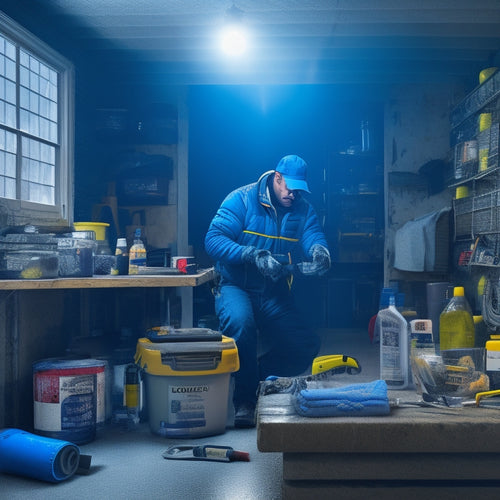
Why Regular Solar Panel Maintenance Matters for Car Owners
Share
As a car owner with a solar panel system, you're likely unaware that a thin layer of dust and dirt can reduce your energy output by up to 20%, making regular maintenance essential for maximizing your panel's performance and minimizing energy losses. Loose connections can lead to electrical issues, and shading from tree branches can decrease energy production. Regular inspections, cleaning, and monitoring energy output can help you optimize your system's performance. By staying on top of maintenance, you'll be able to identify issues before they escalate. There's more to explore to get the most out of your solar panel system.
Key Takeaways
• Regular solar panel maintenance ensures optimal energy output, reducing reliance on traditional fuels and lowering carbon footprint for eco-friendly car owners.
• Proper cleaning and inspection of solar panels can increase energy efficiency by up to 20%, providing a reliable power source for electric vehicles.
• Identifying and addressing minor issues through regular maintenance prevents costly repairs, minimizing downtime and ensuring continuous power supply for car owners.
• Well-maintained solar panels maximize energy harvest, allowing car owners to charge their vehicles more efficiently and reduce their dependence on public charging stations.
• Scheduled maintenance and inspections help car owners detect potential problems early, reducing the risk of sudden system failures and ensuring uninterrupted power supply.
Clean Panels Mean More Power
Dust and dirt accumulated on your solar panel can reduce its energy output by up to 20%, so regularly cleaning your panels is essential to maximize their performance.
You might be thinking, 'What's the big deal? A little dirt never hurt anyone!' But trust us, it's a vital matter. Dust accumulation can greatly decrease your solar panel's energy efficiency, leaving you stuck with a drained battery and a whole lot of frustration.
To avoid this, it's important to clean your solar panels regularly. You can use a soft-bristled brush or a specialized solar panel cleaning tool to gently sweep away dirt and debris. For more stubborn grime, mix water and a mild soap, and use a soft cloth to wipe down the panels. Remember to rinse thoroughly to avoid any soap residue.
Check for Loose Connections Daily
When you're on the move, your solar panel's connections can work loose, so make sure to inspect them daily to prevent electrical issues that can drain your battery. You don't want to be stuck in the middle of nowhere with a dead battery, do you? A daily check can help you avoid voltage fluctuations that can damage your system.
Here are some connection types you should pay attention to:
- MC4 connectors: Make certain they're secure and not damaged.
- Terminal connections: Check for loose screws or corrosion.
- Cable ties: Ensure they're not too tight or loose.
- Fuses and breakers: Verify they're functioning correctly and not overheating.
Loose connections can cause electrical issues, which can lead to a range of problems, from reduced power output to a complete system failure.
By making connection checks a daily habit, you'll be able to identify and fix issues before they become major problems.
Inspect for Shading Issues
As you inspect your solar panels, pay attention to any obstructions that could be blocking sunlight.
You'll want to identify any tree branches or other objects that might be casting shadows on your panels, which can greatly reduce their energy output.
Tree Branch Obstruction
Tree branches hovering above your solar panels can silently sabotage their energy output, casting a shadow that greatly diminishes their performance. As a car owner, you mightn't even notice the subtle decrease in energy production, but trust us, it's a sneaky energy thief! Overhanging branches pose a significant risk to your solar panels' efficiency, and it's vital to address this issue.
Here are 4 key reasons why branch trimming is essential:
-
Reduced energy output: Shading from tree branches can reduce your solar panels' energy output by up to 30%!
-
Premature wear and tear: Leaves and debris accumulating on your solar panels can lead to premature wear and tear, reducing their lifespan.
-
Increased maintenance costs: Neglecting branch trimming can lead to more frequent cleaning and maintenance, adding to your expenses.
- Safety risks: Overhanging branches can also pose a safety risk, as they can break and fall, damaging your solar panels or even your vehicle.
Don't let tree branches steal your solar power! Regular branch trimming is a simple yet effective way to maintain your solar panels' peak performance.
Panel Angle Adjustment
Maximize your solar panel's energy output by inspecting and adjusting its angle to guarantee maximum exposure to direct sunlight, as even slight shading issues can greatly impact its performance. You don't want any obstructions stealing the sun's spotlight, do you?
Inspect your panel's angle to make sure it's at the most efficient angle, which can vary depending on the season. During summer, a steeper angle (around 30-40 degrees) allows for maximum energy harvesting. Come winter, a shallower angle (around 15-25 degrees) is more suitable.
Seasonal adjustments are essential to maximize energy output. A slight miscalculation can lead to reduced energy production. Don't let your panel's performance dwindle due to poor angling. Take the time to inspect and adjust – it's a small task that yields significant returns.
Monitor Energy Output Closely
As you monitor your solar panel's energy output closely, you'll want to track daily energy production to identify any unusual patterns or fluctuations.
By analyzing your energy output data, you'll be able to pinpoint potential issues and make adjustments to optimize performance.
Daily Energy Tracking
Track your solar panel's daily energy output closely to identify any anomalies or performance drops that might signal maintenance needs. You're not just checking in on your solar panel's performance out of curiosity – you're doing it to make sure you're getting the most bang for your buck (or should we say, watt for your buck?).
By keeping tabs on your daily energy output, you'll be able to:
-
Identify patterns: Spot consumption patterns and adjust your energy usage accordingly.
-
Forecast energy needs: Make informed decisions about energy storage and backup systems with accurate energy forecasting.
-
Pinpoint inefficiencies: Detect any dips in performance that might indicate maintenance is needed.
- Optimize energy usage: Adjust your daily habits to maximize energy production and reduce waste.
Energy Output Analysis
You can't afford to overlook even slight deviations in your solar panel's energy output, as they can signal underlying issues that, if left unchecked, can greatly impact its overall performance. That's why monitoring energy output closely is essential.
By doing so, you'll be able to identify any dips in efficiency and take corrective action before it's too late. To make things easier, you can use specialized tools to track your solar panel's energy output and compare it to established performance benchmarks. This will give you a clear picture of how your panel is performing and help you identify areas for improvement.
Pay close attention to efficiency metrics, such as capacity factor and performance ratio, to make sure your panel is operating at its best. By keeping a close eye on your energy output, you'll be able to catch any issues before they escalate, ensuring your solar panel continues to perform efficiently and provide the energy you need to keep your car running smoothly.
Regularly Inspect Mounting Hardware
Regular inspections of the mounting hardware are crucial to guarantee the solar panel system's stability and longevity. So, examine the clamps, brackets, and bolts that hold your panels in place. You don't want your panels to come crashing down due to a loose screw or rusty bracket!
To confirm your mounting hardware is in top shape, check for the following:
-
Tightening torque: Make sure all bolts and screws are tightened to the recommended torque specification to prevent damage or detachment.
-
Rust resistance: Inspect for signs of rust or corrosion on metal components, and apply a rust-resistant coating if necessary.
-
Secure connections: Verify that all electrical connections are secure and not loose or damaged.
- Signs of wear: Look for signs of wear or damage on the mounting hardware, such as cracks, dents, or excessive wear on moving parts.
Keep Track of Warranty Details
After ensuring your mounting hardware is secure, it's vital to maintain a record of your solar panel system's warranty details, including the manufacturer's contact information, warranty duration, and specific coverage terms.
You don't want to be stuck in a situation where you're unsure about what's covered or when the warranty expires. Document organization is key here, folks! Keep all your warranty documents in one place, whether it's a physical folder or a digital file. Make sure you can easily access the information when you need it.
When reviewing your warranty details, pay attention to the warranty duration. How long is your system covered? Are there any specific conditions that can void the warranty? Knowing this information will help you plan for future maintenance and potential repairs.
Don't assume you'll remember everything, write it down! Having a clear record of your warranty details will save you from potential headaches down the road. By staying organized, you'll be prepared for any situation that comes your way.
Schedule Professional Inspections
One essential aspect of solar panel maintenance involves scheduling professional inspections to identify potential issues before they become major problems. You don't want to be stuck with a faulty system that's draining your car's battery or, worse, causing a safety hazard. By scheduling regular inspections, you can catch minor issues before they become major headaches.
Here are some key things to keep in mind when scheduling your inspections:
-
Inspection Frequency: Aim to have your solar panels inspected every 6-12 months, depending on your usage and environmental factors.
-
Don't skip on Technician Qualifications: Make sure your technician has experience with solar panels and is certified to perform inspections and repairs.
-
Check for Loose Connections: A simple loose connection can cause your entire system to malfunction.
- Cleanliness Matters: Dirt and debris can reduce your solar panels' efficiency, so be sure they're cleaned regularly.
Store Panels Properly When Not
When not in use, you should store your solar panels in a dry, cool place to prevent damage from moisture, extreme temperatures, or physical impact. This is especially important during seasonal removal, when you're not using your solar panels to charge your car's batteries.
Improper storage can lead to reduced efficiency, cracked panels, or even complete system failure. So, don't just toss those panels in the garage or trunk – take the time to store them properly.
For proper storage, consider investing in a protective case or cover specifically designed for solar panels. This will shield them from dust, dirt, and other environmental hazards.
If you live in an area prone to extreme weather conditions, consider storing your panels in a climate-controlled environment, like a temperature-regulated garage or storage unit. By taking these precautions, you'll safeguard your solar panels remain in top condition, ready to provide reliable power for your car when you need it.
Frequently Asked Questions
Can I Clean My Solar Panels With a Pressure Washer?
Don't even think about it! Using a pressure washer on your solar panels can cause water damage and reduce panel efficiency. Instead, gently clean them with a soft-bristled brush and mild soap to keep them shining - and efficient!
How Often Should I Inspect My Solar Panel Mounting Hardware?
You should inspect your solar panel mounting hardware every 6-12 months, checking bolts for tightness and signs of rust. Apply a rust inhibitor to prevent corrosion, ensuring your system stays secure and efficient.
Do Solar Panels Work During a Power Outage?
During a power outage, you'll be glad to know solar panels don't work - unless you have a grid backup system, ensuring energy resilience and keeping your lights on when the grid goes dark.
Can I Install Solar Panels on an Old or Damaged Roof?
Before installing solar panels, you'll want to assess your roof's condition, ensuring its structural integrity can support the added weight; a damaged or old roof might need repairs or replacement to safely hold your new panels.
Will My Solar Panels Still Work on Cloudy Days?
"You'll still generate some energy on cloudy days, but your solar panels' energy output will be reduced due to lower panel efficiency - think of it like trying to get a tan on a cloudy beach day, it's just not as radiant!"
Related Posts
-

Waterproofing Solar Panels for Vehicles: A Step-by-Step Guide
When waterproofing solar panels for your vehicle, start by evaluating your energy requirements and selecting the righ...
-

What You Need to Know About Permits and Inspections
You need to navigate the complex landscape of permits and inspections to guarantee your project complies with local z...
-

What You Need to Know About RV Solar Maintenance
When you're out on the road, your RV's solar panel system is your lifeline. But without regular maintenance, you're l...


